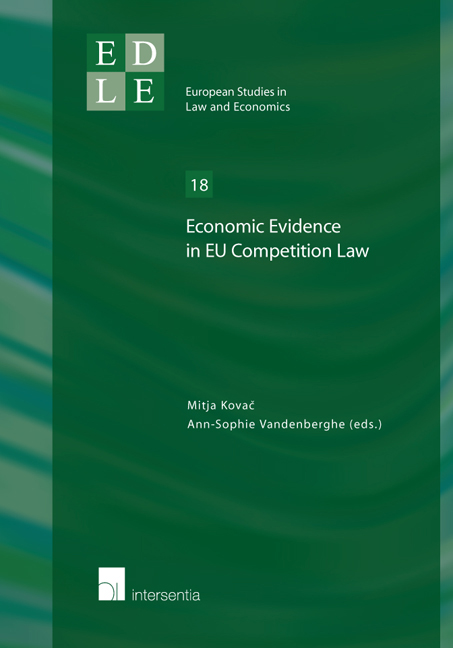Book contents
- Frontmatter
- Dedication
- Preface
- Contents
- List of Contributors
- General Introduction
- PART I ECONOMIC METHODS IN COMPETITION LAW
- PART II ECONOMIC EVIDENCES IN COMPETITION LAW
- PART III INSIDER TRADING, CARTELS AND CRIMINALISATION
- Chapter 8 An Analysis of the Criminalisation of Insider Trading at EU Level
- Chapter 9 The Criminalisation of EU Competition Law
- Chapter 10 Cartel Detection and Collusion Screening: an Empirical Analysis of the London Metal Exchange
- Chapter 11 Damages Claims in the Spanish Sugar Cartel
- PART IV PRELIMINARY RULINGS AND STATE AID CONTROL
- PART V ECONOMIC EVIDENCE, ENFORCEMENT PROBLEMS AND NATIONAL COURTS
- Index
Chapter 9 - The Criminalisation of EU Competition Law
from PART III - INSIDER TRADING, CARTELS AND CRIMINALISATION
Published online by Cambridge University Press: 21 September 2018
- Frontmatter
- Dedication
- Preface
- Contents
- List of Contributors
- General Introduction
- PART I ECONOMIC METHODS IN COMPETITION LAW
- PART II ECONOMIC EVIDENCES IN COMPETITION LAW
- PART III INSIDER TRADING, CARTELS AND CRIMINALISATION
- Chapter 8 An Analysis of the Criminalisation of Insider Trading at EU Level
- Chapter 9 The Criminalisation of EU Competition Law
- Chapter 10 Cartel Detection and Collusion Screening: an Empirical Analysis of the London Metal Exchange
- Chapter 11 Damages Claims in the Spanish Sugar Cartel
- PART IV PRELIMINARY RULINGS AND STATE AID CONTROL
- PART V ECONOMIC EVIDENCE, ENFORCEMENT PROBLEMS AND NATIONAL COURTS
- Index
Summary
INTRODUCTION
European and national competition law prohibits acts restricting competition and thereby defines the limit between the lawful and unlawful acts of competition. According to the legal theory, the primary rules are, defining the required action or the prohibited action. European and national competition law, however, includes also secondary rules, which define the unlawful restriction of competition and sanctions for such conduct. According to the Slovenian Prevention of the Restriction of Competition Act-1 (ZPOmK-1) the unlawful restriction of competition and, thereby violations of primary rules are classified as misdemeanours, for which the undertakings and their responsible persons could be held responsible. Violation of competition law could be classified also as a criminal act, defined by Slovenian national criminal legislation or potentially even European law. Two separate, but also intertwined forms of legal responsibility could therefore arise in the case of the restriction of competition.
This chapter aims to analyse the arguments for regulating and enforcing criminal responsibility in addition to the responsibility for misdemeanours in cases of unlawful restriction of competition in Slovenia and to critically assess current Slovenian legislation. Slovenia namely already defines unlawful restriction of competition as a criminal act in the Criminal Code-1 (KZ-1).
With this aim, the first part of this paper analyses the legislation of the European Union (hereinafter EU), Constitution of the Republic of Slovenia (hereinafter Constitution) and criminal policy in search of potential supranational, constitutional, and policy arguments in favour of the implementation of criminalisation of competition law.
The next part of the paper focuses on current Slovenian regulation concerning the restriction of competition and certain interesting issues, such as the relation between criminal and misdemeanour responsibility of natural and legal persons, the definition of the perpetrator and accomplices to the criminal act of unlawful restriction of competition and leniency institutes, incorporated in Slovenian criminal procedural and substantive law.
IS SLOVENIA OBLIGED TO CRIMINALLY PROSECUTE RESTRICTION OF COMPETITION?
SUPRANATIONAL REASONS FOR CRIMINALISATION OF RESTRICTION OF COMPETITION
As a member of the EU Slovenia has a duty to implement EU law.
- Type
- Chapter
- Information
- Economic Evidence in EU Competition Law , pp. 177 - 202Publisher: IntersentiaPrint publication year: 2016

